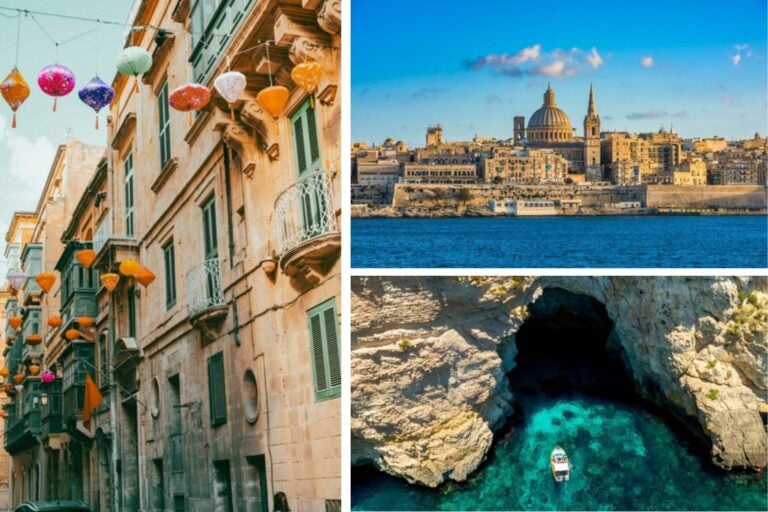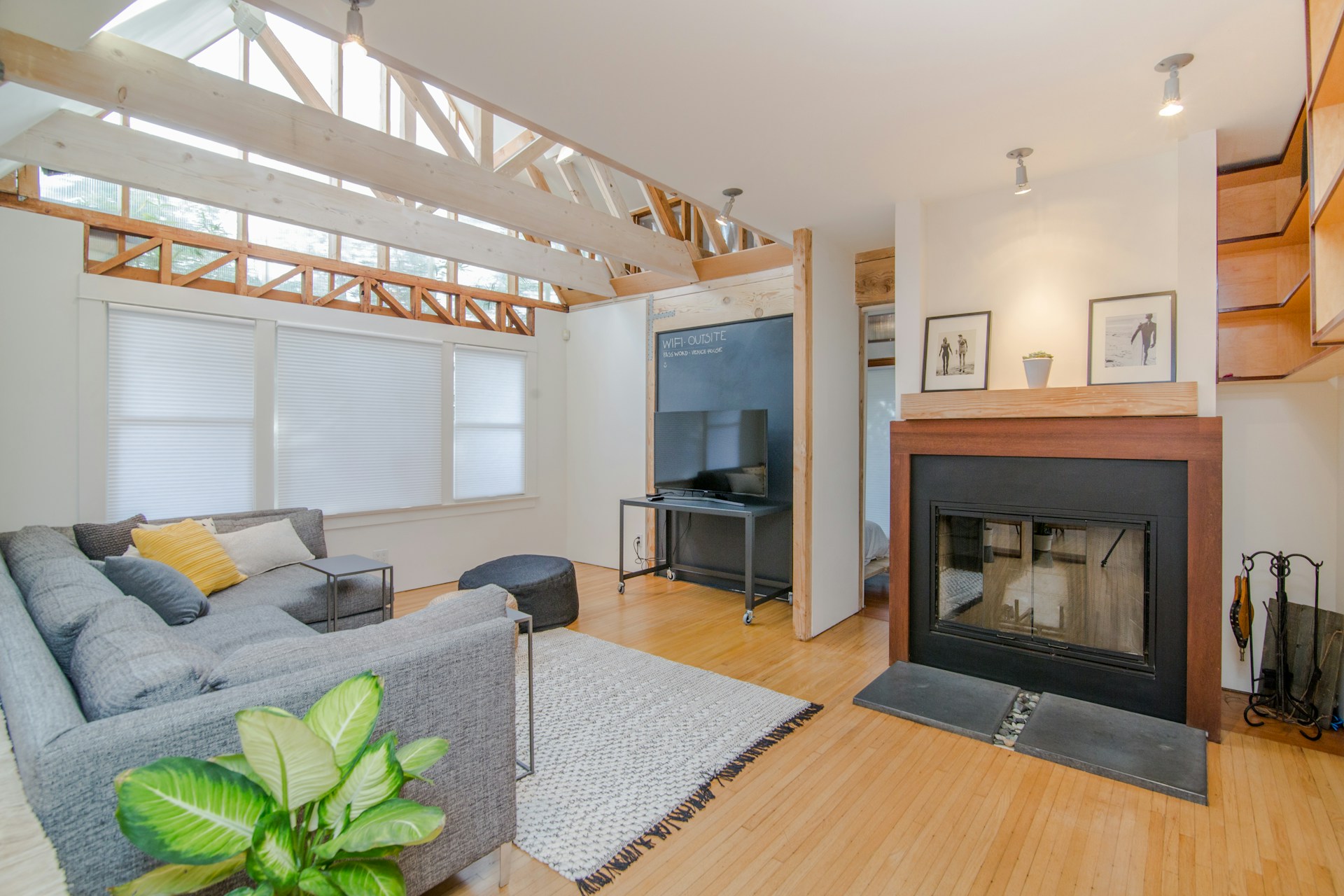Live in Malta: Advantages, disadvantages and costs
Learn what it’s like to live in Malta as a foreigner and see if this Mediterranean island could be your next home.
Are you ready to discover what it’s really like to live in Malta? Moving to the island, whether for a short stay or for good, gives you the chance to enjoy a destination that blends Mediterranean charm with modern comforts, a mild climate and a surprisingly balanced lifestyle.
Malta has just the right balance for a comfortable and secure life while keeping things simple and charming. With its sunny climate, prime location in Europe, welcoming culture, and easygoing lifestyle, every day feels full of energy. It’s a place that invites you to slow down, soak up the sun and sea, and enjoy the little everyday pleasures.
Life in Malta does come with its challenges. Renting can be pricey, getting around the island takes some planning, and island life has its limits. Still, with the right mindset and realistic expectations, Malta can be more than a temporary stop. It could become your new home.
Today, we’re taking you on a journey to see what life in Malta is really like, what advantages it offers, and what challenges you might encounter. By the end, you’ll have a much clearer picture of what moving to this Mediterranean island entails.
Quality of life in Malta
Regardless of the country’s quality of life, the experience of living in Malta as a foreigner is subjective. For some, the historic streets of Valletta, Mediterranean beaches, rural backroads, and the friendliness of the locals feel like paradise. For others, it may not be enough.
Next, we’ll explore what life in Malta is really like, from living costs and education to healthcare, safety, internet access, and more. Whether you are a digital nomad, a student, or a traveler looking for your next home, knowing these details will give you a clearer sense of whether Malta could be the right place for you.
Education in Malta: A great destination for learning English
Malta’s education system is based on the British model, with free schooling that is mandatory from ages five to sixteen. Public schools teach in both English and Maltese, which can be either an advantage or a challenge depending on the student.
This language advantage makes everything from official paperwork to doing business and getting involved in the community much easier. Speaking English also helps newcomers settle in more quickly and feel a sense of belonging on the island.
All of this makes Malta a popular destination for studying English. With its history as a British colony, English is one of the island’s official languages. A wide range of language schools and a pleasant climate draw thousands of students each year who come to learn and improve their English in a safe and welcoming environment.
Is Malta a safe country to live in?
Malta is considered one of the safest countries in Europe. Crime is rare, police are visible in towns and tourist areas, and violent incidents are uncommon. It’s normal to see people out walking alone at night or children playing freely outside.
Even in Malta, it’s wise to stay aware and take basic precautions. Keep an eye on your belongings at cafés, for instance. Small thefts or occasional scams can happen, particularly during the peak tourist season.
Overall, living in Malta offers a constant feeling of safety, even in the busiest areas.
Living costs in Malta
One of the first things that probably comes to mind when you think about moving to another country is the cost of living. Living in Malta isn’t exactly cheap, but it’s not as expensive as some of the priciest countries in Europe either.
Malta has a growing economy, driven by industries like tourism, finance, gaming, technology, and online services. This creates plenty of job opportunities for skilled professionals, although the minimum wage is lower than in some other European countries, averaging around $1,100 to $1,430 per month after taxes.
The cost of living in Malta has gone up in recent years, partly because the island has become so popular. The biggest impact is on rent. Living in places like Sliema, St. Julian’s, or parts of Valletta can be almost as expensive as in Southern European capitals. A one-bedroom apartment typically costs between $990 and $1,430 a month, depending on the area and whether utilities are included. For advice on the best places to live in Malta, check out this article we’ve put together.
On the other hand, transportation, healthcare, and food are relatively affordable. For those earning in strong currencies or working remotely, Malta remains a comfortable and convenient option.
How does the healthcare system work in Malta?
Like many countries, Malta has a mixed healthcare system with both public and private options. Residents who are actively contributing to social security, whether employed or self-employed, can access public healthcare at no cost, including basic medical care, specialist appointments, and hospital treatment. Mater Dei Hospital is the country’s main public hospital and provides high-quality services.
Private healthcare in Malta is well regarded too. Facilities like St. James Hospital provide quick access, multilingual professionals, and up-to-date equipment. Many expats choose private insurance to ensure faster care or wider coverage, and it’s something we recommend as well.
Internet connectivity and technology
Even as an island, Malta is very well connected. In urban areas, fixed-line internet can reach speeds of 100 to 500 Mbps, more than enough for remote work. Companies like GO, Melita, and Epic offer competitive bundles that combine fiber internet, mobile service, and television.
Mobile internet works well across the whole island, even in rural areas. Malta is very tech-friendly, so it’s easy to pay with your phone, use apps for government services, order food, get around, or work from cafés and coworking spaces without any connectivity issues.
If you want to stay fully connected, a Holafly monthly plan can be really useful. With their unlimited data option, you get fast and secure internet no matter where you are. It even works in nearby countries like Tunisia or Italy, making it perfect for travel around the region.
Important: If you are a frequent traveler and want to stay connected without worrying about expensive roaming or looking for a new SIM at every destination, Holafly’s subscription plans are for you. With a single eSIM, enjoy internet in more than 170 countries for a fixed price and no surprises on your bill. Travel without limits and connect easily and securely! 🚀🌍

Advantages of living in Malta
Living in Malta is about more than its endless sunny days and beautiful seaside beaches. The island can provide a truly rewarding experience, especially for those who value a relaxed lifestyle, mild weather year-round, and easy access to the rest of Europe.
Here are some of the reasons why more and more foreigners are choosing to move to Malta.
Mediterranean climate all year round
One of the biggest perks of living in Malta is the weather. With over 300 days of sunshine a year, mild winters, and long summers, the island is perfect for anyone who loves spending time outdoors, by the sea, and soaking up natural light.
This environment encourages an active and healthy lifestyle. Outdoor sports, coastal walks, and dining on terraces are common for much of the year, even during the cooler months.
Strategic location within Europe
Malta’s location is another big advantage. Nestled in the heart of the Mediterranean, just south of Italy, east of Tunisia, and north of Libya, the islands cover a little over 300 km², with 168 km of coastline. It’s an ideal place to work in the sun, live by the sea, and enjoy activities like diving or snorkeling in your free time.
Malta is part of the European Union and a member of the Schengen Area, making travel across the continent easy without dealing with immigration formalities. Whether for work or leisure, you can reach most European capitals from Malta’s international airport in under three hours.
Relaxed lifestyle and safe environment
In a world that moves faster every day, relocating to a country that encourages a slower pace of life is a true privilege. Even in busier cities like Sliema or Valletta, the atmosphere is far less hectic than in other European capitals. Life moves at a relaxed pace, distances are short, and public spaces invite you to enjoy them without rush.
Another big plus is the feeling of safety. People often leave their things on the beach without worry, and children play outside freely. This relaxed atmosphere is a real draw for anyone seeking a calmer, more welcoming environment.
Language accessible to foreigners
English is one of Malta’s two official languages, alongside Maltese, and it’s widely used in everything from government and business to schools and everyday life. This makes it much easier to settle in, since you won’t have to learn a new language to handle paperwork, look for work, study, or make friends.
Efficient and bilingual healthcare system
Malta’s healthcare system is well organized and provides high-quality public and private services. Most doctors and healthcare professionals speak English, removing one of the biggest barriers for newcomers.
Private health insurance is also reasonably priced, hospitals are well equipped, and getting medical appointments is usually quick, especially through the private system.
Active international community
Malta may be small, but it’s culturally diverse. Expats from across Europe, Latin America, and Africa live and work on the island, creating a vibrant and welcoming community. It’s no wonder the country is such a popular destination for digital nomads.
Once you’ve settled in and start to get a feel for life in Malta, you’ll find plenty of international events, multicultural cafés, networking groups, and coliving spaces with people from all over the world. Making friends, building connections, and creating a support network is easier than you might expect.

Disadvantages of living in Malta as a foreigner
We’ve already covered all the benefits of living in Malta. That said, it’s important to be realistic. No country is perfect, and moving away from home always comes with its challenges. Let’s see what living in Malta can be like in that regard.
High rents and limited housing supply
One of the biggest challenges in Malta is finding a place to live. Demand often exceeds supply, especially in cities like Sliema, St. Julian’s, and Valletta. Prices have risen in recent years, and it’s common to find small apartments costing as much as in major European capitals.
For a more budget-friendly option, check out areas like Gzira, Mosta, or Marsaskala where rents are generally lower. It’s also a good idea to start your search early, consider coliving, or arrange temporary housing while you look for a permanent place.
Limited infrastructure outside urban areas
Malta is a small country, but service levels vary from place to place. Outside the main urban areas, sidewalks may be scarce, public transport less frequent, and reaching certain services can require longer trips.
Living outside the main cities has its benefits, but it’s important to think about how easy it will be to reach your school or workplace. In many cases, having a bike, scooter, or car can make daily life much simpler.
Irregular public transportation
Buses cover the whole island, but service can be infrequent and unpredictable, especially during rush hours or on weekends. Malta doesn’t have a metro or train system, and traffic can build up in both tourist areas and residential neighborhoods.
If your job or studies require daily commuting, it’s best to live close to your destination or consider personal transport options. E-bikes and scooter-sharing services are becoming increasingly popular in cities like Sliema and Gzira.
Very hot and humid summers
Malta’s Mediterranean climate is a big reason people choose to live here, but summers can be very hot. July and August often see temperatures above 35 °C with high humidity, so if you’re not used to the heat or don’t have air conditioning, it can be quite challenging.
Even if it costs a bit more, choose accommodation with good ventilation or air conditioning. Also, try to avoid long trips around midday and adjust your schedule to the heat, just like the locals do.
Noisy nightlife in tourist areas
St. Julian’s and Paceville are known for their vibrant nightlife. If you value quiet and rest, these areas might not be ideal, especially during the busy season. The noise and constant tourist activity can be disruptive, even on weekdays.
The best advice is to take your time researching the area before renting and visit both during the day and at night. Neighborhoods like Balzan, Naxxar, or certain parts of Valletta offer a quieter, more residential environment.
Small island: Feeling of confinement for long stays
Malta’s compact size makes it easy to get around, but some people start to feel a little boxed in after a few months, especially if they come from larger cities. Living on an island has its benefits, but life can feel a bit repetitive over time.
The best thing to do is take advantage of Malta’s location. Plan short trips to other European countries. From Luqa Airport, you can find budget flights to Italy, France, Spain, and Greece, giving you a chance to break the routine without breaking the bank.
Frequently asked questions about living in Malta
Whether you need a visa depends on your nationality and how long you plan to stay. Citizens of the EU can live and work in Malta freely. If you’re from outside the EU, you’ll need a residence permit for work, study, or long-term stays. There are also specific options for digital nomads and freelancers, like the Nomad Residence Permit.
The cost of living depends on your lifestyle and where you choose to live. On average, a person needs around $1,300 to $2,000 per month to live comfortably, covering rent, food, transport, and leisure. Cities like Sliema and St. Julian’s tend to be more expensive, while areas like Mosta or Marsaskala are more affordable.
It really depends on what you want. Sliema, Gzira, and St. Julian’s are modern, well-connected, and popular with internationals. If you’re after something quieter, Mosta, Rabat, Balzan, or Marsaskala are solid options. And for a more authentic or family-oriented vibe, the nearby island of Gozo has some lovely choices.
Healthcare in Malta is both efficient and accessible. Residents who contribute to social security can use the public system, which covers doctor visits, hospital stays, and basic treatments. Private care is also high quality, with modern clinics and English-speaking staff. Still, many expats choose to get private health insurance for faster service and greater flexibility.





 Language
Language 


















 No results found
No results found








